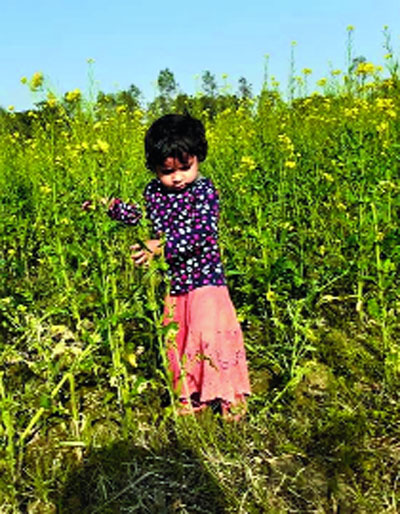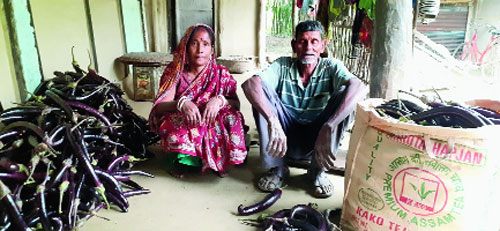Work hard, take part in social events, love children and be happy.
This is the mantra of a fulfilling life, said Shyamla Biswas, 55, and Mohan Lal Biswas, 60, who have set an example for those who feel defeated by life’s challenges.
Despite losing their sons in a suspected attack by Ulfa (Independent) cadres on November 1, 2018, in Dhola block in Upper Assam’s Tinsukia district, the couple has been able to recover.
“Ai jibon to sukh aaro dukher mela (Life is a fairground of happiness and sorrow). There is day and night, light and darkness and winter and spring. We must be able to accept everything. Soon after the incident, we used to cry all day and had given up of food and water. Several relatives, friends and well-wishers came to extend their condolences and sympathy. Later their number became fewer and then none. One day, my husband and I had a conversation and decided move on in life. We started working again,” Shyamla told The Telegraph.

Their granddaughter Maina. Picture by Manoj Kumar Singh
Shyamla lost three members of her family — her sons Abinash, 23, and Anant, 18, and brother-in-law Shyam Lal Biswas, 55 — in the massacre. Abinash was married with a daughter. Both their sons were running a mobile shop adjacent to their house, while Mohan Lal’s younger brother Shyam Lal used to run a grocery shop nearby.
“‘What will I bring for you all from the market,’ Ananta used to ask us whenever he would go to Tinsukia. I used to wonder why didn’t the extremists kill me instead of my sons. They could have lived their lives. But later I thought I should spread love and affection among the children around me and work hard. We started working on our vegetable farm again. There is an axiom, baysto thako, mosto thako (Be busy, be happy). And this worked for us. Slowly we regained our normal pace of work. During the day, we work in the field, collect vegetables and sell them in market and distribute among the needy for free in the afternoon. We get peace and satisfaction out of this. We love the children of our village and take part in social gatherings,” Shyamla added.
After the tragedy struck, extreme loneliness gripped the couple. Shyam Lal’s wife, who suffers from fear psychosis, left home with her children and started living at her maternal home. Abinash’s wife, too, left home with her two-year-old daughter.
“I am happy to see Shyamla living a normal life. She says she sees her sons’ faces in all children around her. She loves them all and distributes chocolates and sweets whenever she can. Shyamala worries if anyone among them is ill and skips school for a day She tells them stories in the evening. I feel better these days,” Mohan Lal said.
In the massacre, two more persons — Dhananjay Namsudra, 22, and Subal Das, 50 — (all Bengali-speaking people), were gunned down.
All of them had been abducted from their shops and houses in Bishonimukh village at Dholla block in the Sadiya Assembly and Lakhimpur parliamentary constituencies. The village is 1km west of the Dhola-Sadiya bridge.
“It is also a pleasure to live a farmer’s life amid the nature. The land near the Brahmaputra is very fertile, ideal for vegetable and paddy cultivation. We don’t need more. A two-time’s meal is enough for us. We take part in almost all social and religious gatherings here. Sometimes we meet Abinash’s wife and our granddaughter Maina. She also visits us often. This is how the life goes on,” Mohan Lal said.
There are nearly 300 Bengali households here that are dependent upon cultivation. The shops run by the victims’ families were closed after the massacre.










